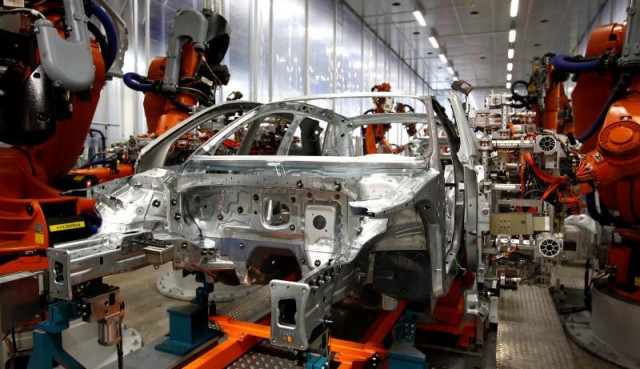Pakistan introduces FED slabs for auto sector
Duty levied on cars of all engine capacities

A car manufacturering plant.
PHOTO: REUTERS
During the budget announcement for fiscal year 2019-20, multiple tax slabs were introduced and cars of engine capacity ranging from 0 to 1,000cc were proposed to be taxed at 2.5%, cars from 1,001cc to 2,000cc at 5% and cars from 2,001cc and above at 7.5%.
“Through the Finance Supplementary Second Amendment Act 2019, 10% FED was introduced on cars of 1,700cc engine capacity and above. Now, it is proposed to enlarge the scope of FED,” argued Minister of State for Revenue Hammad Azhar while presenting the budget.
The minister also pointed out that currently extra tax of 2% was payable on many items such as lubricants, batteries, auto parts, tyres and tubes, which was in addition to the sales tax.
He suggested the withdrawal of the extra tax on auto parts and moving some items to Third Schedule of the Sales Tax Act.
“In order to realise the full revenue potential, it is proposed that these items (auto parts and arms and ammunition) be moved to Third Schedule of the Sales Tax Act 1990. However, the government has proposed the withdrawal of extra tax on auto parts to reduce the cost of production of the local industry,” elaborated Azhar.
JS Research termed the new tax slabs a negative development for the sector.
“This is negative news for the automobile sector,” said Topline Research analyst Hammad Akram. “Initially, the duty was levied on engine capacity of 1,700cc and above, but now the government has spread it across the board.” The consumers’ purchasing power was already weak and this decision would lead to a hike in car prices, which would take the vehicles out of the reach of common man, he said.
According to him, this decision would result in an adverse impact on the auto sector. “The rupee has depreciated against the dollar by about 44% since December 2017,” he said. “Its impact is also expected on the automobile sector.”
The analyst highlighted that recent auto sector numbers were discouraging and the market expected a further decline in these numbers. He was of the view that the situation of the auto sector would worsen in the near future.
Cement and steel
The government has proposed a hike in the FED on cement from Rs1.5 per kg to Rs2 per kg. JS Research termed the increase a bad news for the sector and pointed out that it would increase the cost of 50kg cement bag by Rs25.
On the other hand, the PTI government has given relaxation to the steel industry. “To promote non-traditional exports, the decrease in duty from 11% to 5% on steel strips for razor exporters is being proposed,” said the minister.
The government expressed its intention to restore the normal tax regime for the steel sector.
Azhar elaborated that currently the sales tax on the steel sector was collected through electricity bills at Rs13 per kilowatt-hour. He added that imported scrap used in making billets was subject to sales tax at Rs5,600 per ton, which is adjustable.
Published in The Express Tribune, June 12th, 2019.
Like Business on Facebook, follow @TribuneBiz on Twitter to stay informed and join in the conversation.



















COMMENTS
Comments are moderated and generally will be posted if they are on-topic and not abusive.
For more information, please see our Comments FAQ